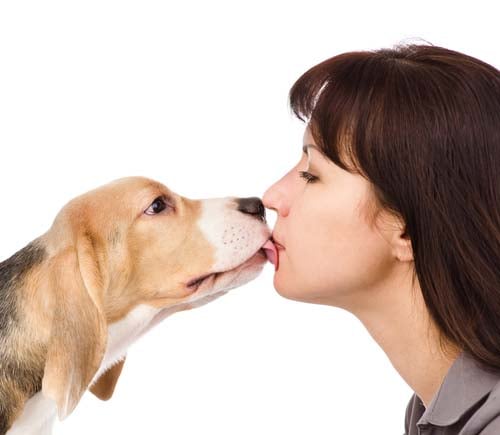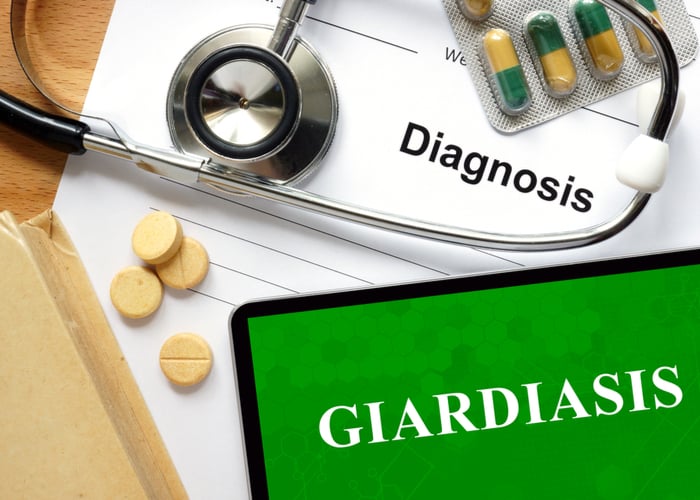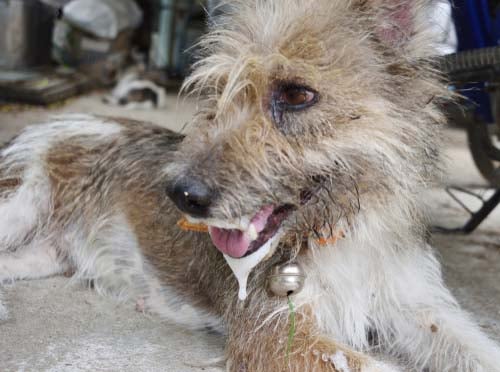
Table of Contents
If you have been caring for dogs for quite a while now, you must have known we can get sick from them. Rabies, giardia—name it.
After all, it's not uncommon for an animal-borne disease to be transferred to people (a.k.a. zoonosis.)
But on the flip side… can dogs get sick from humans?
In this article, we'll cover:
- the process of zoonosis and reverse zoonosis
- human illnesses that dogs can contract
- illnesses we can get from our dogs
- how to prevent this animal-to-human and human-to-animal transmission
Let's get to it!
Can Dogs Get Sick From Humans?
To answer this question, yes, our dogs can get sick from us.
First, let's familiarize ourselves with the process called zoonosis, where a certain disease can be transmitted from animals to humans through pathogens—viruses, bacteria, fungi, or parasites.
The World Health Organization defines zoonosis as “any disease or infection naturally transmissible from vertebrate animals to humans.”
There are 200 types of zoonoses in existence today, which means there are 200 types of known human diseases of animal origin.
In fact, the coronavirus (yes, exactly like the SARS-CoV-2 virus that caused COVID-19) is zoonotic. It's believed to have originated from bats, then to pangolins (as intermediary species), and then to humans.
The animal-to-human transmission has been well described, thanks to numerous studies and research. However, transmission from the opposite direction is still much less understood.
This is called reverse zoonosis, where human diseases are transferred to animals.
Some examples are cats catching the H1N1 flu and chimpanzees contracting the human metapneumovirus, which caused them to get upper respiratory infections.
But perhaps the most animal interaction we get these days is with dogs. After all, a whopping 65.1 million US households own a canine companion.
What are the possible illnesses we, pet owners, can transfer to our dogs?
What Illnesses Can Dogs Get From Us?
Dermatophytosis, a.k.a, Ringworms
The most common fungal infection that dogs can get from humans is dermatophytes.
It's usually found as a superficial nail, skin, and hair infection because it requires keratin to grow.
Fungal pathogens like dermatophytes were among the earliest pathogens to be studied to demonstrate reverse zoonosis in 1988.
Actually, dermatophytosis can be easily transmitted through direct contact from infected human to human, human to animal, animal to human, and animal to animal.
Dogs (and humans) can also get it from contact with contaminated objects or surfaces.
Because this fungus is resistant, its spores can be dormant for up to 18 months.
Dermatophytes is the general term for fungi that grow on keratin. Some common species of dermatophytes that also infect animals and humans are Microsporum and Trichophyton.
So, if you see an itchy, ring-like red mark on your skin, you better not cuddle with your dog until after you get that treated.
Flu
If you have the common flu, you shouldn't worry about your dog getting it.
There's still an ongoing debate about whether we can transmit our flu virus to dogs, and there's not much scientific evidence that supports either.
But that's only for the common flu.
A 2015 research concluded that the influenza viruses H1N1 (Swine flu) and H3N2 can be transmitted to dogs without them experiencing any symptoms.
And also, remember the news about dogs contracting COVID-19 from their owners?
Yes, it's also possible for our furry pals to get the virus, however rare it may be.
But the good news is that they don't transmit it as well as humans, which means they are unlikely to pass the virus to another person.
As for the symptoms, most dogs that tested for the COVID-19 virus only got it mild.
Symptomatic dogs mostly had a loss of appetite and appeared to be sluggish.
Cats, on the other hand, got it harder. Those who tested positive experienced difficulty breathing and runny noses.
In fact, felines are more susceptible to catching the flu from humans—yes, even just the seasonal one.
They can also easily get the flu from other animals. Avian flu, H1N1 (a.k.a. swine flu), and their own bane, the cat flu.
Needless to say, it's better to maintain distance from your dogs, cats, or animals living nearby if you have any flu, just to be sure.
Giardiasis
This is a diarrheal disease caused by the parasite Giardia duodenalis that lives in the intestinal tract of its host and passes on as greasy stool.
The thing about Giardia is it can survive for a long time even after it's expelled from the host's body.
We're talking about weeks or several months here.
Giardia spreads easily. If you come in contact with a contaminated surface, even just the tiniest amount of it, you're most likely to get it, too.
This means that if you have it and you have a dog (who I'm sure follows you around wherever), your dog is also likely to contract Giardia from you.
The good thing, though, is Giardia in dogs is curable with the proper guidance from a veterinarian. It's preventable, too.
Just make sure to keep all surfaces clean in your house, don't let your dog drink from suspicious water sources like a puddle, and always wash your hands.
Salmonellosis
Salmonellosis spreads like the Giardia—you can get them from any contaminated surface, but mostly from improperly handled food.
The bacteria Salmonella can easily be transferred from humans to animals or animals to humans. It can lead your dog to dehydration, sepsis, and, in some cases, death.
To prevent this, make sure to cook food properly, prepare your meals in a sanitized area, and store leftovers properly.
Read CDC's prevention tips here.
Campylobacteriosis
Caused by the bacteria, Campylobacter is one of the most common culprits of diarrhea among humans.
A 2004 study found the occurrence of this bacteria in dogs and cats living with infected humans.
Interestingly, the study also found that bacterial transmission from human to animal “occurs more frequently between younger patients and their pets,” specifically, patients of 17 years and younger.
The Campylobacter bacteria also spreads through contaminated food and stool.
It can cause your dog watery poop, abdominal pain, lethargy, and fever.
If you have diarrhea, it is better to isolate yourself to keep your pet (and other family members) from getting the disease.
Methicillin-resistant Staphylococcus aureus (MRSA)
Another bacterial infection, MRSA, is commonly found in human skin and nasal passages of humans and can be transferred to animals by direct skin-to-skin contact or through contaminated objects and surfaces.
People with a weak immune system are the most susceptible to MRSA, and they can experience skin infections with wounds and pus that don't heal, among other things.
In animals, MRSA can appear as an inflamed, infected skin with hair loss, redness, and rashes.
Tuberculosis
Pet owners who tested positive for the Mycobacterium tuberculosis bacteria can infect their dogs with tuberculosis.
This was the case of a Yorkshire Terrier who experienced cough, weight loss, and vomiting six months after his owner was diagnosed with TB.
Unfortunately, he was later euthanized because of a urethral obstruction.
Mumps
Mumps is a viral infection that can cause inflammation in the salivary gland, and yes, your dog can get it from you if you have it.
The transmission usually happens through saliva, coughing, sneezing, and sometimes, even touching objects or surfaces an infected person touched.
While it's rare, dogs can still get mumps.
It can manifest through neck, jaw, or eye swelling. They will also have loss of appetite, lethargy, and listlessness.
Fortunately, this is preventable in humans, thanks to the MMR (Measles, Mumps, Rubella) vaccine, but dogs have no way of preventing this except for their pet owners taking precautionary measures.
What Illnesses Can We Get From Dogs?
Some of the diseases we have included above can also originate from dogs and pass on to us humans.
But of course, there are some that we can get from them, which we have listed below:
- Rabies – We already know how infected dogs can transfer rabies to humans—through their bite or scratch. Transmission can also happen if the saliva comes into contact with any open wound or mucosa (eyes or mouth.)
- Leptospirosis – While this is more common in rodents, your dog can still get leptospirosis. And when they do, they can pass the bacteria to you via their contaminated urine.
- Tick-borne Diseases – Although humans can't get tick-borne diseases directly from dogs, they can still be carriers of the parasites that can give us these fatal diseases. Rocky Mountain Spotted Fever, Ehrlichiosis, and Anaplasmosis are only some tick-borne diseases.
- Toxocariasis – This is caused by the parasitic roundworms found in dogs' intestines. The shed eggs through their feces can contaminate the soil. Any kid who likes playing with dirt can come into contact with the contaminated soil and get this disease.
- Dog Flu – Recent studies show that the H3N2 virus that dogs contract slowly evolves into a canine-specific mutated virus and is now better at recognizing human-cell receptors. This means there's a looming possibility of this dog flu infecting humans.
Some people are more susceptible to getting diseases from dogs. According to the Centers for Disease Control and Prevention, those who are at high risk are:
- kids younger than 5 years old
- pregnant women
- adults 65 or older
- people with weakened immune system
So if you live with people who fall into the category above (or you yourself are one), then all the more safety precautions are necessary, which we will discuss next.
How to Prevent Catching Diseases from Our Dog and Vice Versa
You can prevent catching each other's diseases by practicing good hygiene and being vigilant to prevent pathogens from entering your homes and affecting you and your pets.
- Always wash your hands—before handling food, after cleaning poop, after petting other animals, etc.
- Clean and sanitize your house and your surrounding environment. Pet bowls and pet bedding should also always be washed and sanitized.
- Vaccinate your pets on time, and make sure they're always protected from parasites.
- If you feel like something's off with your pet, e.g., he's not behaving naturally, he seems in pain, or he's showing any symptoms, don't hesitate to go to the vet immediately.
- Go for your regular wellness checkups with the vet even if your dog doesn't seem to be sick.
Frequently Asked Questions
Can dogs get stomach virus from humans?
Yes, it's possible for dogs to get stomach viruses from humans.
One study found that the Norovirus, the virus responsible for gastroenteritis, can also be found in dogs of owners with stomach flu.
It's even possible for pregnant dogs who contracted the Norovirus from humans to pass it to their puppies, as concluded by this study in Thailand.
However, not all dogs that tested positive for norovirus displayed stomach flu symptoms, like vomiting, diarrhea, etc.
It's also worth noting that there could be numerous causes of gastroenteritis in dogs, like eating spoiled food, reaction to medications, or other medical conditions.
Can dogs get pneumonia from humans?
Dogs can't get pneumonia, per se, from humans.
While some bacteria that humans can pass to dogs, like Bortadella, can cause respiratory illness, it's uncommon for canines and humans to share the same respiratory infection bacteria.
What is the most fatal disease in dogs?
The number 1 most deadly disease in dogs remains to be rabies. In fact, any mammal is susceptible to getting (and dying) from this disease.
Other fatal diseases in dogs are canine parvovirus and distemper.
Check out our list of the 11 Most Deadly Dog Diseases. You can also learn more about rabies by reading these articles:
- 10 Signs of Rabies in Dogs and Three Prominent Stages
- How Do Dogs Get Rabies and How Do You Prevent It?
- Scientists Now Understand How Rabies Works in the Dog's Brain
Dogs Can Get Sick From Humans! But, Before You Go…
It's not impossible to prevent any diseases from transferring between you and your dog as long as you take precautionary measures, like practicing proper hygiene and maintaining cleanliness in your environment.
While dogs can get sick from humans (and humans can get sick from dogs!), this is more uncommon than living a fun, peaceful, and, most importantly, healthy life with your furry pal.
Have you experienced something similar? Please share it with us in the comments section!
You can also read our recommended articles below.
















